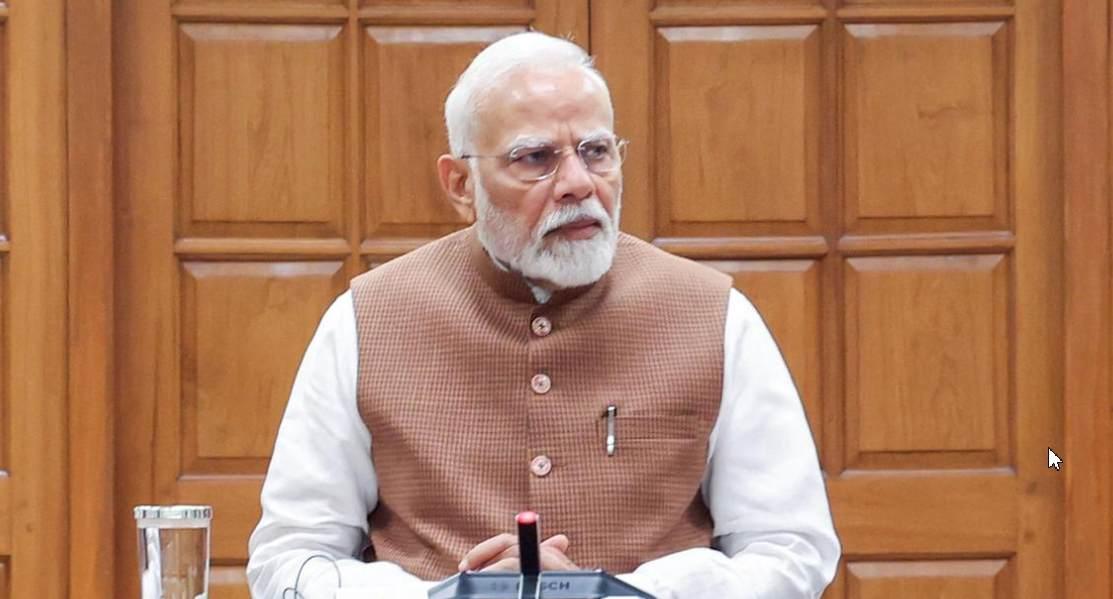New Delhi, May 23: In a significant move, Prime Minister Narendra Modi will meet the family of a victim killed in the terrorist attack in Jammu and Kashmir's Pahalgam later this month, Times Now has learnt.
The move comes after Indian armed forces carried out a military operation targeting terrorist launchpads in Pakistan and Pakistan-occupied Kashmir to avenge the April 22 massacre.
Over 100 terrorists, including high-value targets linked to the IC-814 hijack and the Pulwama blast, were killed in the operation.Sources said that PM Modi will meet the family of Pahalgam attack victim Shubham Dwivedi during his visit to Kanpur on May 30. "This will be PM Modi's first visit after the Pahalgam attack, and as per sources, he is scheduled to go on May 30," a source said.Shubham Dwivedi was one of the 26 people killed in the deadly Pahalgam terror attack.
A 31-year-old businessman from Kanpur, Shubham Dwivedi married Aishanya on February 12 this year. The couple was in Kashmir on a week-long holiday, visiting Sonamarg and Gulmarg before reaching Pahalgam.Shubham's family has thanked the government for carrying out Operation Sindoor.
New Delhi's action on terrorist camps in Pakistan instilled a sense of faith in the country's government, they said."I salute the Indian army and thank PM Modi, who listened to the pain of the country's people. The way the Indian military has destroyed the terrorism that is flourishing in Pakistan, I thank our military for that... My entire family has been feeling light since we heard this news..." Shubham's father said.Manoj Dwivedi, a relative of Shubham Dwivedi, said India has delivered justice to the victims through Operation Sindoor.
"On 22nd April, when our child lost his life, we said that a revolution is going to come in our country, and we were sure that PM Modi will take the strictest step to finish terrorism. I want to thank PM Modi for the real tribute that the Army has given today to our son..." the relative said.'Operation Sindoor An Unbroken Pledge of Justice'Addressing the nation on the eve of 12th May, PM Modi made it clear that 'OPERATION SINDOOR' is not just a name but is a reflection of the feelings of millions of people in the country and an unbroken pledge of justice.
"We remain committed to taking strong steps to safeguard India and its people. On the battlefield, we have always defeated Pakistan, and this time. Operation Sindoor has added a new dimension," he said. Prime Minister outlined the following points in relation to Pakistan and cross-border terrorism. "First, if there is a terrorist attack on India, a fitting reply will be given.
Secondly, India will not tolerate any nuclear blackmail. India will strike precisely and decisively at the terrorist hideouts developing under the cover of nuclear blackmail. Thirdly, we will not differentiate between the government sponsoring terrorism and the masterminds of terrorism. We will continue to take decisive steps to protect India and our citizens from any threat," he said."If there are talks with Pakistan, it will be only on terrorism; and if there are talks with Pakistan, it will be only on Pakistan-occupied Kashmir (PoK)," he added.India's Retaliatory ResponseThe Indian Armed Forces launched coordinated and accurate missile strikes on nine terrorist bases-4 located in Pakistan (including Bahawalpur and Muridke) and 5 in Pakistan-occupied Kashmir (such as Muzaffarabad and Kotli). These locations were key command centers of Jaish-e-Mohammed (JeM) and Lashkar-e-Taiba (LeT), responsible for major attacks like Pulwama (2019) and Mumbai (2008).Deep strikes into Pakistan's mainland, including Punjab and Bahawalpur, eliminated the distinction between terrorists and their state sponsors.
Within just three hours, India targeted 11 military installations including Noor Khan, Rafiqui, Murid, Sukkur, Sialkot, Pasrur, Chunian, Sargodha, Skardu, Bholari, and Jacobabad.The attack targeted major ammunition depots and airbases such as Sargodha and Bholari, where F-16 and JF-17 fighter jets were stationed. As a result, nearly 20% of Pakistan's air force infrastructure was destroyed.After Pakistani artillery and mortar attacks targeted civilian areas in the Poonch-Rajouri sector along the Line of Control, Indian forces retaliated, destroying terrorist bunkers and Pakistani army positions that were targeting civilians.Unable to withstand further damage, Pakistan initiated the ceasefire, with its Director General of Military Operations (DGMO) reaching out to the Indian DGMO. Pakistan also approached the United States to broker calm. On May 10, 2025, at 1700 hours both sides agreed to halt military actions on land, air, and sea.
Leave a comment
Your email address will not be published. Required fields are marked *


